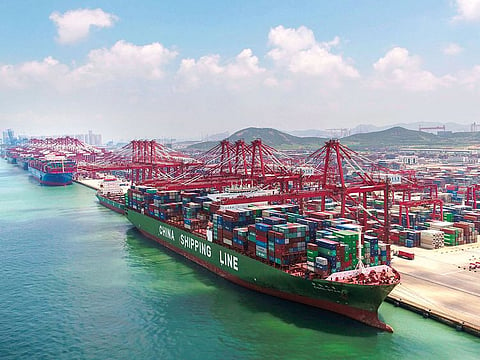Chinese goods flood UAE retail, construction markets
Everything from consumer goods to steel now has less pricey options, setting off worries

Dubai: The full-on US-China trade tiff has spilt into the UAE and GCC marketplace.
The retail and construction sectors here in the UAE are feeling ripples from the spike in trade tensions, with Chinese manufacturers and suppliers looking to alternate markets to feed their goods.
These goods are flowing in at prices far lower than existing market levels and hurting trader/supplier margins. But for UAE consumers, it means prices on some key essentials have remained in check … or dropped further.
When the Chinese start pushing goods into any market, there’s no stopping them.

“In retail, the flood is mostly of consumer goods and apparel, and this is where prices are most affected,” said Sanjay Duggal of the Middle East and North Africa Franchise Association. “The dumping has not happened in the foodstuffs trade as yet.
“In construction, every category except for cement is feeling the pressure from cheaper imports.” (On cement, the UAE has sizeable manufacturing capacity of its own, and there are also plants in the other Gulf markets that can meet needs at fairly stable price levels.)
Retailers need to watch out
If the Gulf markets sees a flood of Chinese goods, it would be a cause for concern. It’s next to impossible to compete against Chinese goods purely on prices, local businesses say.
According to Bharat Bhatia, whose company Conares operates steel mills in the UAE, “When the Chinese start pushing goods into any market, there’s no stopping them. It’s never about prices for them, but about liquidating whatever they produce.”
For those in the retail sector, it means ever more caution on how they manage their current stock levels. When their consumers are getting more conscious about their daily spends, they tend to go for the low cost option. This is the space Chinese-made goods rules, and everyone from licensed suppliers of popular brands to supermarket chains will have to factor in this.
The strong dollar
Market sources say that Chinese dumping needn’t be the only reason why consumer prices have not seen sharp increases in recent weeks. The dollar’s strong, and with the dirham peg, importing goods is not necessarily that expensive across multiple categories. Plus, currencies in key supplier markets in Asia too are under extreme duress, which again works to local consumers’ favour.
But sharply rising inflows of Chinese goods into the local and regional markets could set off deflationary pressures. And that can be quite the worry for economies yet to move into higher growth rates.
Margin pressures
Bhatia says the construction sector here can clearly feel the impact of such large-scale diversion of Chinese manufacturing capacity. While prices for steel rebars haven’t felt the pinch of Chinese competition, flat steel — a staple of industry — definitely has been hit by dumping.
“Thankfully, on steel rebars, the UAE is running on slightly over capacity in domestic manufacturing, but no such luck in flat steel,” said Bhatia. “There are supplies coming in from China at much lower levels than what the market has been used to.
“It’s not just local traders who get hit with stocks they brought in at a higher price … the entire market suffers if margins drop below sustenance levels because there are always cheaper Chinese made options.”
Cannot call for higher import duty
Unlike in steel rebars, which has built up sizeable domestic manufacturing capacity, demand for flat steel products is mostly met by imports. “That would make it difficult for any local player to call for government support in imposing higher duty on Chinese imports,” said Bhatia. (The government, of course, has such duty protection on steel rebars, which they have reinforced with other actions in the recent past.) “But even those categories that are not directly affected by Chinese dumping, there will be liquidity worries. Banks are worried about the current situation where traders are offering extended credit cycles of 6-9 months, delaying receivables. All of this can easily dry up liquidity.”
No impact on cargo insurance
Middle East tensions may be on edge following recent Iran actions on the high seas … but so far they haven’t had an impact on marine cargo premiums.
“The only insurance premium hikes were for the ships themselves using certain routes,” said Mustafa Vazayil, who heads Gargash Insurance. “But on the cargo specifically, there has been none.
“Now, if the US trade war escalates, the UAE should benefit as the Chinese seeks more markets at lower prices. You will have marine cargo insurers seeking business at reduced premiums — one thing is for sure, nothing is going to go up in the near future.”



